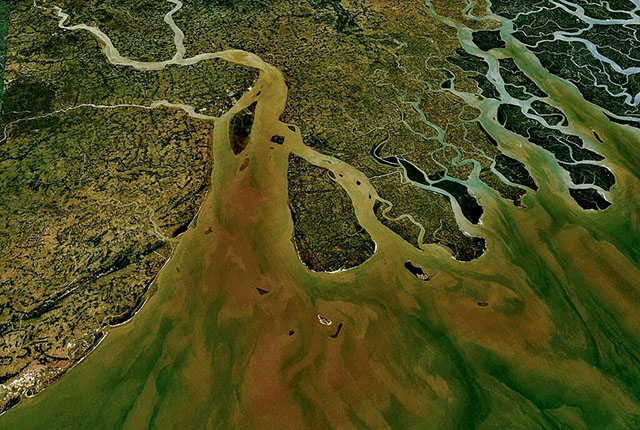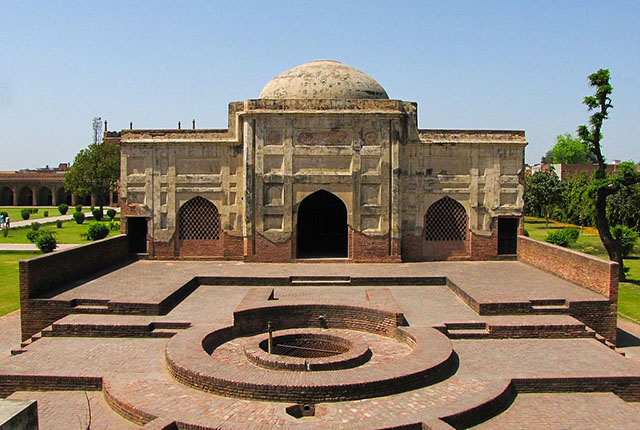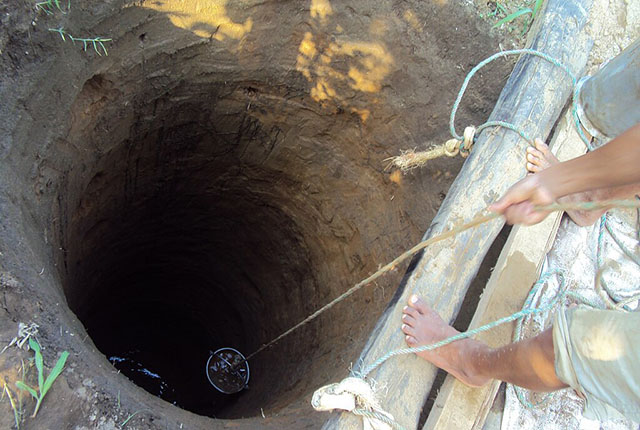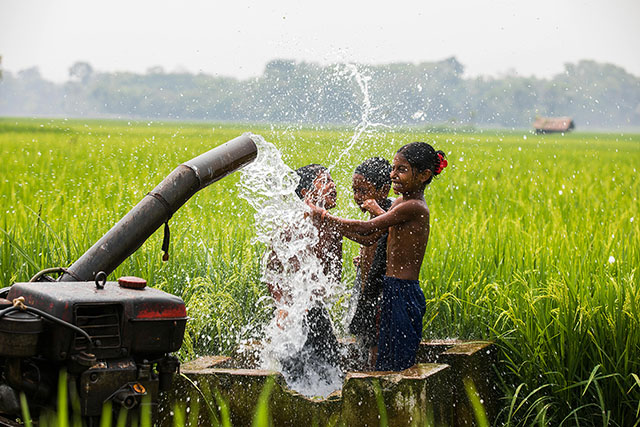The Indo-Gangetic basin aquifer is one of the world’s most important transboundary water resources and the most heavily exploited aquifer in the world. Despite this, there are few, if any, studies discussing the transboundary hydrogeology of the aquifer system. This three-year research programme, funded by the Department for International Development (now the Foreign, Commonwealth & Development Office), strengthened the evidence base linking groundwater resources, climate variability and abstraction with emerging policy responses in the Indo-Gangetic basin.
This project was funded by the DFID South Asia research hub and ran from 2012 to 2015.
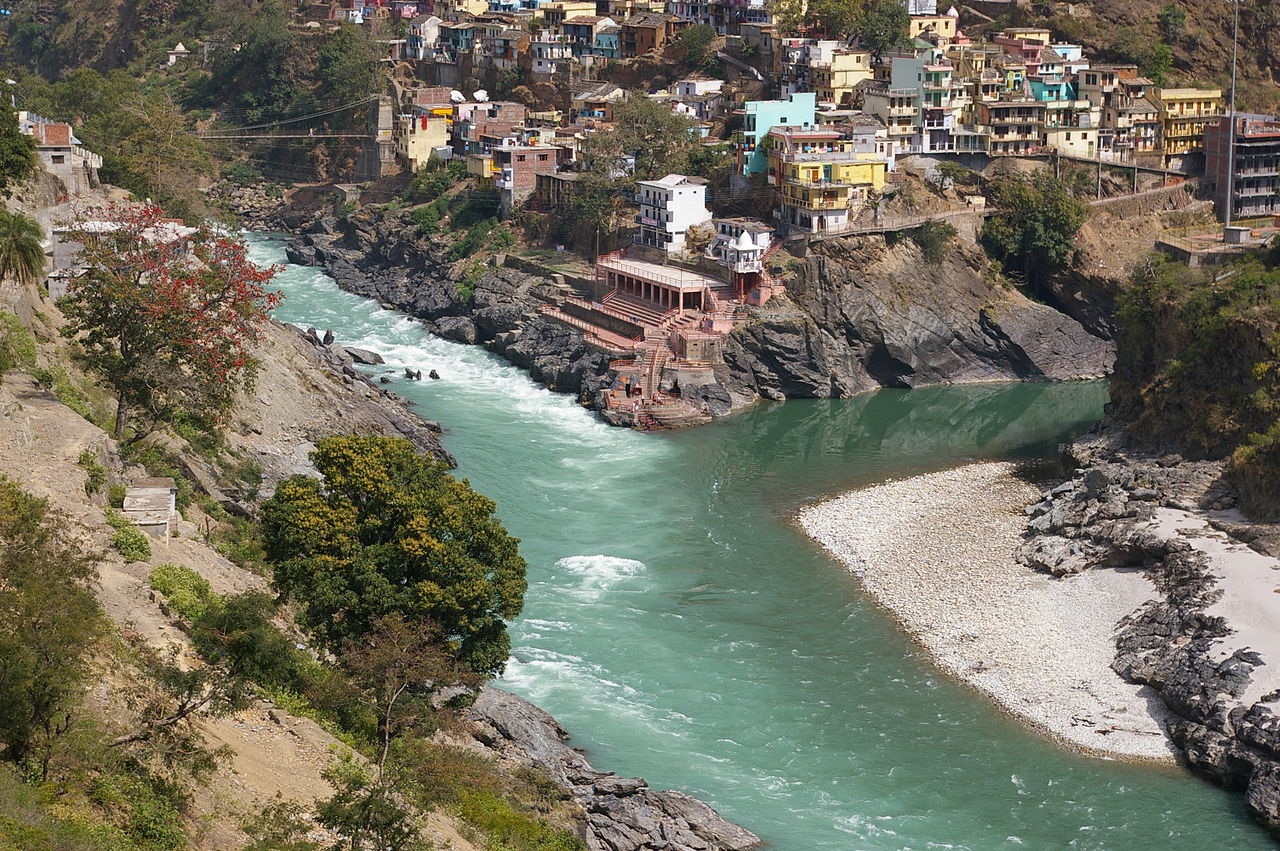
The confluence of the rivers Bhagirathi and Alaknanda at Devprayag in Uttarakhand, India. The two rivers join together here to form the River Ganges. © Vibhuti Venkat Nataraj under the Creative Commons Attribution-Share Alike 3.0 Unported license.
Research
The aim of the project was to improve and develop new understanding of the Indo-Gangetic basin aquifer at a transboundary scale. There were two main objectives:
- strengthen the evidence base linking groundwater resources, climate and abstraction through a series of case studies
- develop a strategic overview assessment of the occurrence and status of groundwater resources in the aquifer
A basin-wide assessment systematically reviewed and collated the best available national, regional and local-scale geological, sedimentological, hydrogeological, hydrochemical, hydrological and climatological datasets for the aquifer. New basin-wide maps and seven major groundwater typologies were developed to illustrate the significant spatial differences in aquifer properties and areas of different resilience to abstraction and climate change.
Targeted case studies examined critical knowledge gaps in groundwater response to climate and abstraction in different parts of the basin, including:
The project consortium team involved science teams from Pakistan, India, Bangladesh and Nepal, alongside researchers from the UK, USA and the Netherlands. Led by BGS, the main institutions within the consortium were:
- IIT Kharagpur (India)
- ISET-Nepal
- ISET-International
- MetaMeta (India)
- National Institute of Hydrology (Roorkee) (India)
- Overseas Development Institute
- University College London (UK)
- University of Dhaka (Bangladesh)
A four-day workshop in Delhi in November 2013 (Bonsor and MacDonald, 2013) brought together all the project partners to discuss each component of the project, data, case study progress and groundwater typologies framework.
- A final project report on the groundwater resources in the Indo-Gangetic Basin (MacDonald et al., 2015)
- A paper revealing that sustainable groundwater supplies in the aquifer are constrained more by extensive groundwater contamination than depletion (MacDonald et al., 2016)
- A series of new transboundary aquifer maps, developed to provide new high-resolution information on groundwater abstraction, groundwater-level trend, salinity and arsenic, and estimated groundwater storage at aquifer scale
- Seven new major groundwater typologies for the Indo-Gangetic basin aquifer that delineate areas with distinct sets of challenges and opportunities for groundwater development (Bonsor et al., 2017)
- New, key field data on sustainability of intensive irrigation in north-west India (Lapworth et al., 2015)
Bonsor, H C, and MacDonald, A M. 2013. Groundwater resources in the Indo-Gangetic Basin: resilience to climate and abstraction: project workshop meeting, Delhi, 4-7 November 2013. British Geological Survey Internal Report IR/13/060. (Nottingham, UK: British Geological Survey.)
Bonsor, H C, MacDonald, A M, Ahmed, K M, Burgess, W G, Basharat, M, Calow, R C, Dixit, A, Foster, S S D, Gopal, K, Lapworth, D J, Moench, M, Mukherjee, A, Rao, M S, Shamsudduha, M, Smith, L, Taylor, R G, Tucker, J, van Steenbergen F, Yadav, S K, and Zahid, A. 2017. Hydrogeological typologies of the Indo-Gangetic basin alluvial aquifer, South Asia. Hydrogeology Journal, Vol. 25, 1377–1406. DOI: https://doi.org/10.1007/s10040-017-1550-z
Lapworth, D J, MacDonald, A M, Krishan, G, Rao, M S, Gooddy, D C, and Darling, W G. 2015. Groundwater recharge and age-depth profiles of intensively exploited groundwater resources in north-west India. Geophysuical Research Letters, Vol. 42(18), 7554–7562. DOI: https://doi.org/10.1002/2015GL065798
MacDonald, A M, Bonsor, H C, Taylor, R, Shamsudduha, M, Burgess, W G, Ahmed, K M, Mukherjee, A, Zahid, A, Lapworth, D, Gopal, K, Rao, M S, Moench, M, Bricker, S, Yadav, S K, Satyal, Y, Smith, L, Dixit, A, Bell, R, van Steenbergen, F, Basharat, M, Gohar, M S, Tucker, J, Calow, R S, and Maurice, L. 2015. Groundwater resources in the Indo-Gangetic Basin : resilience to climate change and abstraction. British Geological Survey Open Report OR/15/047. (Nottingham, UK: British Geological Survey.)
MacDonald, A M, Bonsor, H C, Ahmed, K M, Burgess, W G, Basharat, M, Calow, R C, Dixit, A, Foster, S S D, Gopal, K, Lapworth, D J, Lark, R M, Moench, M, Mukherjee, A, Rao, M S, Shamsudduha, M, Smith, L, Taylor, R G, Tucker, J, van Steenbergen F, and Yadav, S K. 2016. Groundwater quality and depletion in the Indo-Gangetic Basin mapped from in situ observations. Nature Geoscience, Vol. 9, 762–766. DOI: https://doi.org/10.1038/ngeo2791
Contact
Please contact Alan MacDonald for further information.


